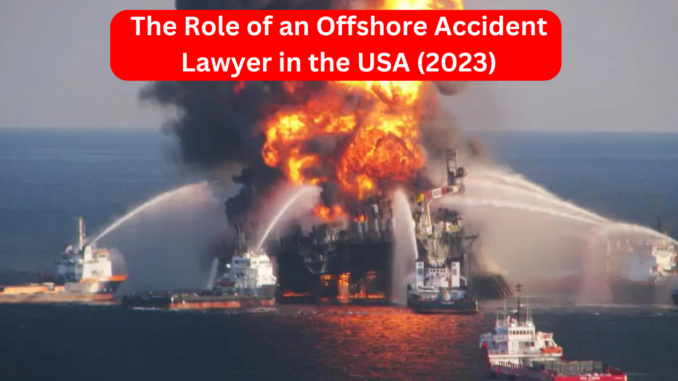
Introduction
Offshore accidents, particularly in the USA, continue to pose significant risks to workers in the maritime industry. Despite stringent safety regulations and advancements in technology, accidents can still occur, leading to severe injuries, environmental disasters, and economic losses. In such complex and high-stakes cases, offshore accident lawyers play a crucial role in representing victims and ensuring they receive fair compensation for their injuries and losses. In this article, we will delve into the importance of offshore accident lawyers in the USA in 2023, the challenges they face, and the legal landscape governing maritime accidents.
Understanding Offshore Accidents
Offshore accidents encompass a wide range of incidents that occur at sea, on offshore rigs, platforms, vessels, and other maritime facilities. Common causes of offshore accidents include equipment failure, human error, inclement weather, fires, explosions, and collisions. These accidents often result in serious injuries, such as burns, fractures, head injuries, and even fatalities. Moreover, offshore accidents can lead to environmental pollution, disrupting marine ecosystems and local economies that depend on fishing and tourism.
The Role of Offshore Accident Lawyers
Offshore accident lawyers are legal professionals specialized in maritime law and personal injury cases involving offshore accidents. Their primary responsibility is to represent and protect the rights of individuals who have suffered injuries or losses due to offshore accidents. These lawyers possess in-depth knowledge of maritime law, federal regulations, and case precedents that apply specifically to offshore accidents.
- Investigating the Accident: The first step in any offshore accident case is a thorough investigation. Offshore accident lawyers work with experts, accident reconstructionist, and other specialists to gather evidence, determine liability, and understand the root cause of the accident.
- Determining Liability: Identifying the responsible parties in an offshore accident can be complex. Depending on the circumstances, liability might lie with the employer, vessel owner, equipment manufacturer, or other entities. Offshore accident lawyers use their expertise to pinpoint the liable parties and hold them accountable.
- Advocating for Fair Compensation: Offshore accidents often result in significant medical expenses, lost wages, and emotional trauma. Offshore accident lawyers strive to secure fair compensation for their clients to cover these losses and help them rebuild their lives.
- Dealing with Insurance Companies: Insurance companies representing the liable parties may try to minimize payouts or deny claims altogether. Offshore accident lawyers negotiate with these insurers, ensuring their clients’ rights are protected and they receive the compensation they deserve.
- Representing in Court: In cases where settlement negotiations fail, offshore accident lawyers represent their clients in court. They present the evidence, argue the case, and advocate for their clients’ best interests before a judge and jury.
The Legal Landscape of Maritime Accidents in the USA
Maritime law is a specialized branch of law that governs activities at sea and navigable waters. In the USA, several key laws and regulations are relevant to offshore accidents:
- Jones Act: Enacted in 1920, the Jones Act allows qualifying seamen to seek compensation for injuries caused by the negligence of their employers or coworkers. The Act also grants them the right to sue for damages, making it a critical tool for offshore accident lawyers representing injured maritime workers.
- Longshore and Harbor Workers’ Compensation Act (LHWCA): This federal law provides compensation and medical benefits to maritime workers who are not seamen but work in or around navigable waters. Offshore accident lawyers often utilize LHWCA to secure compensation for dockworkers, ship repairers, and other non-seamen employees.
- Outer Continental Shelf Lands Act (OCSLA): OCSLA extends federal jurisdiction over the outer continental shelf, where many offshore oil and gas operations occur. It incorporates state laws where applicable and plays a vital role in determining liability and compensation in offshore accidents.
- General Maritime Law: Apart from specific statutes, general maritime law principles also govern offshore accidents. These include the doctrine of unseaworthiness, which holds vessel owners responsible for providing safe and seaworthy vessels for their crew.
Challenges Facing Offshore Accident Lawyers
Representing clients in offshore accident cases presents unique challenges for lawyers:
- Jurisdictional Complexities: Offshore accidents often occur in international waters or areas subject to multiple jurisdictions. Determining the appropriate jurisdiction for filing the claim can be challenging and time-consuming.
- Limited Time for Filing Claims: The statute of limitations for filing offshore accident claims is typically shorter than for land-based accidents. Offshore accident lawyers must act swiftly to protect their clients’ rights.
- Complexity of Evidence: Gathering evidence in offshore accident cases can be arduous, especially when critical evidence lies underwater or deep in the ocean. Advanced technology and the expertise of specialists are required for effective evidence collection.
- High-Stakes Litigation: Offshore accident cases involve significant financial interests for all parties involved. As a result, litigation can become contentious and highly adversarial, requiring experienced and skilled offshore accident lawyers to navigate the legal battles effectively.0
Conclusion:
Offshore accidents continue to pose risks and challenges to the maritime industry and those who work in it. In the USA, offshore accident lawyers play an indispensable role in representing victims and advocating for their rights. Through their expertise in maritime law, these lawyers investigate accidents, determine liability, negotiate with insurers, and represent their clients in court. As the maritime industry evolves, so will the role of offshore accident lawyers, ensuring that victims receive the compensation they deserve while promoting safety and accountability at sea.
Leave a Reply